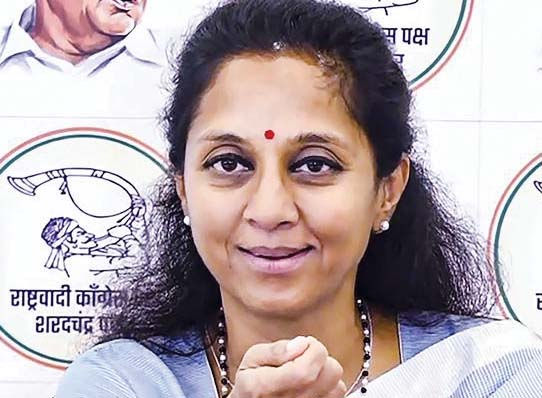Sule rules out reuniting with cousin Ajit
- Manisha Rege
- Nov 8, 2024
- 2 min read

Mumbai: NCP (SP) working president Supriya Sule has said political rapprochement with Deputy Chief Minister Ajit Pawar is not possible till he is aligned with the BJP and said she will not be a CM post aspirant if the MVA is voted to power.
In an exclusive interview to PTI, four-time Lok Sabha member Sule said people voted very assertively in the 2024 Lok Sabha elections and there is clarity in voters’ mind now.
Sule said, “It is hard to say whether Pawars can reunite with Ajit Pawar politically. As long as he is working for the BJP it will not be easy. Our ideologies still remain a challenge politically.”
On speculations that she could be the MVA’s CM face, she said, ‘I am not contesting elections and the NCP (SP) has made it clear that we are not in the race for CM’s post. We have clarity and we will go along with whoever our partners decide .”
Asked if the upcoming assembly polls will settle the fragmented polity in Maharashtra, the parliamentarian said the Lok Sabha election results have settled the confusion.
‘There is already clarity in the state. There is no issue as such except that the legal fight continues because of the illegal way parties were broken, the illegal way they were given to people...the fight will continue,’ she said.
The NCP (SP) is contesting 86 out of 288 assembly seats (as per the seat-sharing arrangement of MVA allies) in the state elections and is confident of doing well, she said.
Sule said she doesn’t see the contest in Baramati assembly seat, Pawars’ family bastion where Ajit Pawar is pitted against his nephew Yugendra Pawar, as anything more than an ideological fight.
“We are aligned with the Congress and they with the BJP. We are fighting the BJP, so we fight their allies,” she said.
MVA not countering Ladki Bahin scheme
Supriya Sule has said the opposition MVA is not planning to counter the Maharashtra government’s flagship Ladki Bahin Yojana, but questioned the amount provided under the scheme in view of the soaring inflation. Under the Ladki Bahin Yojana, women with an annual family income of less than Rs 2.5 lakh are given Rs 1500 per month as aid. On the scheme being called a “gamechanger” ahead of the November 20 state assembly polls, Lok Sabha member Sule in an interview to PTI said, “All depends on how you see it and who is saying it.”
“Rs 1,500 is given to women and at the same time oil prices, food inflation is at an all-time high. Sales dropped during Diwali and the state GDP is not flattering. Crimes against women have gone up,” she pointed out.





Comments